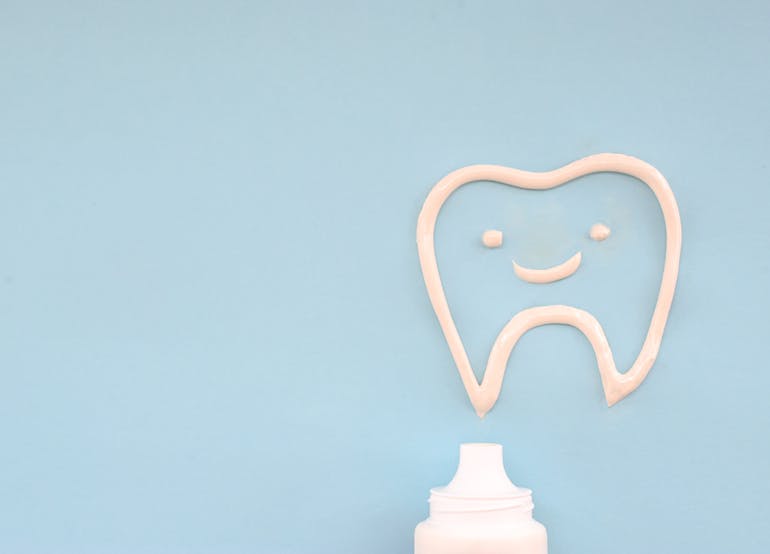What is the Correct Toothpaste to Use for Dentures?
Just like natural teeth, dentures, whether full or partial, require the correct care if you want to keep them in tip-top condition. If you want to prevent stains and reduce the risk of gum disease (which we're sure you do), you'll need to do everything you can to remove food, plaque, and the build-up of tartar.
When you take good care of your dentures, they’ll feel more comfortable in your mouth and will stay fresher. An essential part of keeping your dentures looking their best is to adopt a daily cleaning routine. Regular cleaning will also help you avoid bad breath.
There's a wide range of cleaning products you can use, but what is the best toothpaste for dental wearers? While it might be tempting to use regular toothpaste... is there a better option?
Here's a few helpful tips and answers on improving your denture care.
What is Denture Toothpaste?
The problem with regular toothpaste is that it can be very abrasive when you brush it directly onto dentures. This is because most dentures are made from porcelain, plastic, or a combination of both.
A denture toothpaste will be mild and gentle enough to clean your dentures without causing any damage.
Before deciding on which denture cleanser to purchase, talk to your dentist about your options. They’ll help you decide on the best option for your dental health needs. Factors that need to be considered include:
- The type of dentures
- What the dentures are made of
- Additional cleaning products you might need to ensure the best oral hygiene, such as:
- Mouthwash
- Dental floss
- Fluoride toothpaste for your gums and tongue
What Should Good Denture Care Include?
You can use denture toothpaste to keep your dentures clean, but it should form part of your denture care routine rather than be the only thing you use.
Good denture care includes the following:
Removing Your Dentures After Eating and Rinsing Them Thoroughly
All you need to do is run water over your dentures after you’ve eaten. This will be enough to remove any food debris left behind and other types of loose particles. It’s a good idea to place a towel in the sink or on the counter when you rinse your dentures or put a small amount of water in the sink. By doing this, you’re reducing the risk of your dentures breaking if you drop them.
Handling Your Dentures With Care
Your dentures are delicate, so you must handle them with care. Be careful not to damage the plastic or bend your dentures or clasps when you’re cleaning them.
When You Remove Your Dentures, Clean Your Mouth
You should take care of your mouth and gums as part of your denture care routine. When you remove your dentures for cleaning, spend some time cleaning your mouth and any natural teeth. You can use a soft-bristled brush for your natural teeth and a soft toothbrush or gauze to clean the roof of your mouth, cheeks, and tongue.
Brush Your Dentures At Least Once a Day
Aim to remove and clean your dentures every day. You can soak and then brush them using a soft-bristled toothbrush. Choose a nonabrasive denture cleanser as this will remove any plaque, food, and other deposits.
If a denture adhesive is used to secure your dentures, you can remove any adhesive by cleaning the grooves that fit against your gums.
Soaking Your Dentures Overnight
Many types of dentures need to be kept moist to maintain their shape. You should check with your dentist about how to store your dentures overnight. Make sure to follow the manufacturer’s instructions around using soaking and cleaning solutions.
Rinsing Your Dentures Thoroughly
If you soak your dentures overnight in a mild-denture soaking solution, don’t forget to rinse them thoroughly before you put them back in your mouth. This is because denture solutions often contain harmful chemicals. If you ingest them, it could result in burns, pain, or vomiting if swallowed.
Schedule Regular Checkups With Your Dentist
When your dentures are fitted, your dentist will generally give you some advice on how often you need to return for a checkup. Dentures need to be examined regularly and professionally cleaned.
During a checkup, your dentist will also be able to ensure your dentures fit properly and there is no discomfort or slippage. It’s also likely that they’ll check the inside of your mouth to ensure it’s healthy.
If at any time you feel your dentures aren’t fitting properly, return to your dentist. Loose dentures can be very uncomfortable and lead to sores, irritation, and infection.
Things You Should Avoid When Cleaning Your Dentures
There are several things you should avoid if you want to take the best care of your dentures.
- Abrasive cleaning methods: Always avoid toothbrushes that have stiff bristles. Harsh kinds of toothpaste and strong cleansers should also be avoided. All of these are far too abrasive and will only damage your dentures.
- Whitening kinds of toothpaste are fine for people with natural teeth. However, if you wear dentures, this type of toothpaste should be avoided as they often contain peroxide. While it may be very effective at removing stains from natural teeth, it will have very little effect on the colour of your dentures.
- Products containing bleach: Don’t be tempted to use any kind of bleaching product because you think it will remove stains from your dentures or change their colour. If your dentures contain any metal attachments, don’t soak them in a solution that contains chlorine. Chlorine is known to tarnish and corrode metal.
- Hot water: Believe it or not, hot or boiling water is not good for your dentures because it could warp them. While boiling water is very effective at killing bacteria, it can also warp the plastic that your dentures are made from.
Conclusion
Cleaning your dentures is essential if you want them to stay healthy and not cause discomfort. You can use standard toothpaste on your natural teeth, but your dentures require a slightly different approach.
Rinse your dentures after eating to remove any debris. Clean them with a soft-bristled brush, and soak them overnight in a denture cleaning solution.
Denture Cleaning FAQs
How can I remove tartar from my dentures?
In general, it’s very difficult to remove tartar from your dentures just by brushing. The best thing is to stop the tartar from forming in the first place. You can do this by using a denture cleanser regularly.
What is the best solution for cleaning dentures?
The best way to clean your dentures is to rinse them using lukewarm water. Then brush them with a soft-bristled brush and soak them in a denture cleanser product.
Can dentures be cleaned with toothpaste?
No, toothpaste is generally not recommended for cleaning dentures. Instead, you should rinse them in lukewarm water, clean them with a soft-bristled toothbrush, and then use a denture cleaning solution.
Can I brush my dentures when they’re in my mouth?
You don’t have to take your dentures out to clean them, however, when you remove them it does allow you to clean the rest of your mouth and tongue.
Will bleach hurt my dentures?
You should never use bleach or any products containing bleach on your dentures. It will weaken and discolour the dentures.
Can dentures be soaked in salt water?
If you’re looking for a safe DIY cleaning option, you can soak your dentures overnight in a solution of salt and water. Use cold water and one tablespoon of regular table salt.
Can I use hydrogen peroxide to clean my dentures?
There is no reason to use hydrogen peroxide as its whitening and cleaning properties are very limited. A much better option is to use a professional denture cleaning solution as this will give you much better results.
What toothpaste is safe for my dentures?
If you want to give your dentures a refreshing clean, rinse them under cool running water, brush them with a soft-bristled toothbrush, and soak them overnight in a denture cleaning solution. This is more than enough, but if you really want to use toothpaste, only use one that’s specifically designed for dentures.

